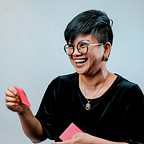I was taught to be a racist.
I was taught to be a racist like I was taught to be afraid.
To be scared of the night, alleyways, and the dark. To be scared of drugs, violence, and gangs. To be scared of that which was unfamiliar. I was taught to be a racist like I was taught that sometimes race was all a person was.
I was taught to be a racist like how my parents were taught to be racists.
Arriving from Thailand in the early 90’s — the only way they had ever seen Black people portrayed was in movies, more often than not as the “bad guys”, the ones who did drugs, who participated in violence, who were a part of gangs. My parents didn’t meet many Black people in real life until they came to America and until we started living in downtown Houston, a multicultural city full of people who didn’t look like the people my parents grew up with. My parents were taught to be racist because the media that exposed them to the outside world determined that Black people were thugs, that Brown people were bad hombres, and that Indigenous people were savages.
I was taught to be a racist even against myself.
When we moved to the suburbs I really felt my race — the yellowness of my skin, my eyes, and the strangeness of the foods I loved. I was taught to be ashamed of who I was. I was taught that I was not normal, that even if I tried I’d always be abnormal. I couldn’t scrub the melanin from my skin, the almond from my eyes. I was taught to be a racist and I was taught to hide.
I was taught to be a racist, but I can unlearn.
I can unlearn how to be a racist, but it should make me question everything that I thought I knew.
That there are systems that were created to ensure that there was a difference between me and the people who do not look like me. And that system — that designed system — was also only made to benefit one type of person. A normal person. That a normal person was likely white, likely male, likely Christian and fundamentally “American” — not like me. Me, the abnormal person. I can unlearn how to be a racist, but I need to first learn that normal has a definition and that that definition has an author and that author is a white man.
I can unlearn how to be a racist, but I should know that I am not alone.
That there are millions — billions of us, learning how to not only not be racists, but to be antiracist. That being antiracist is the act of undoing our old definitions, our old standards, and to permanently reshape our own definition of what is normal. That normal can be all races, creeds, shapes and sizes with all their differences, united in the struggle for our own humanity, for love, and health, and safety. I can unlearn how to be a racist, but first I need to consume the stories of people of different races and find ways to experience life through the eyes of others and to learn my history and theirs.
I can unlearn how to be a racist, but I first need to reconsider what it is that I am afraid of.
That there are valid things to fear in this world, like poverty, pandemics and politics, but not people. At least, not purely because of their race.
It is hard not to feel the electricity of this time as an American citizen in a polarized nation. When, at this time, even breathing safely feels like a privilege. Where there are calls for violence from those maskless, spitting, angry, who are demanding things return to normal.
But things will never be normal again.
Because in a normal world, I was taught to be a racist.
But now, I am teaching myself to be an antiracist.
Ploy Buraparate is one of the co-founders of the Antiracism Activation Kit, a guide to antiracism fundamentals. She works on this project alongside Andi Lozano and Karah Garcia, where they create materials, host trainings, and give talks on how to tactically bring antiracism work into your everyday life. She is also co-host of the podcast Interstice, alongside Tina Zeng, which is focused on sharing community stories.
